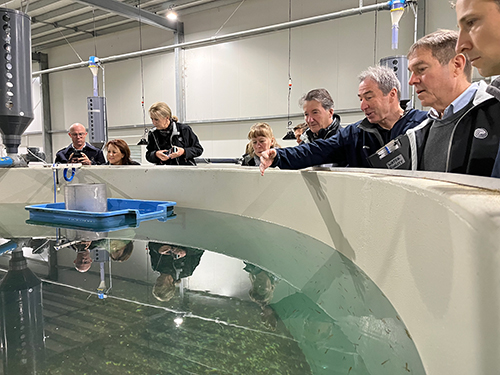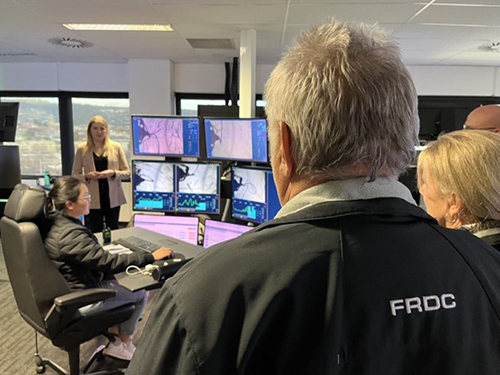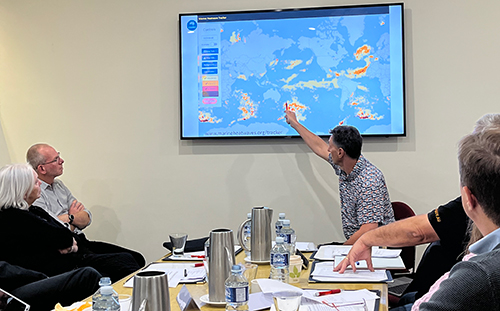By Dempsey Ward
Earlier this month FRDC directors and supporting staff travelled to Hobart to engage with stakeholders and undertake the June FRDC Board meeting. While in Tasmania, the group visited representatives of the fishing and aquaculture sectors.
First stop was the Huon Aquaculture Group’s Forest Home Salmonid hatchery at Judbury, where they were given an in-depth overview of their state-of-the-art facilities and techniques.
Huon Aquaculture representatives Matt Whittle, David Mitchell, and Jasmine Knowles walked FRDC through the process of rearing Atlantic Salmon (Salmo salar) from an egg, all the way to a size where the fish can be transferred from freshwater to the ocean. They also heard about Huon’s strategic initiatives around circular economy, recycling plastics and alternative energy sources.

Early life feeding strategies and managing critical water parameters are key to maximising the growth and survival of Atlantic Salmon at Huon Aquaculture’s Forest Home hatchery.
Directors and staff also visited True South Seafood’s processing facility, where the Long Spined Sea Urchin (Centrostephanus rodgersii) was being processed. Production Manager at True South Seafood, Simon Leonard, outlined the process of harvesting the tasty and highly prized roe (called Uni) from the urchins.

FRDC directors and supporting staff were pleased to see how this invasive urchin species, which is extending its range into Tasmanian waters and impacting the marine environment, is being converted into a valuable export product destined for the restaurants of southeast Asia, the middle east and Europe.
True South Seafood also mentioned their work on the FRDC-funded project, which will ensure Australian producers maximise the opportunity arising from the extension of this species, into southern waters. This investment will help increase processing of the Long Spined Sea Urchin from 500 to 700 tonnes annually, helping the environment and generating valuable employment opportunities and export income for the Tasmanian community. This project is a collaboration between True South Seafood, Honey and Fox, and FishTales.
The final visit ended with Directors and Staff observing Tassal’s impressive feed centre. They saw first-hand how Tassal’s state-of-the-art technology allows staff to feed Atlantic Salmon from the comfort of an office. This technology has created new jobs, improved staff safety, and ensures feed isn’t wasted.

Tassal has seen a significant improvement in feed conversion ratio now that feeders have eyes below the waterline and can observe fish feeding behaviour and pellet dispersal.
Tassal representatives explained that the system has improved site surveillance, and shortened response times to stock and infrastructure issues by allowing decision makers to see what is happening in real time, at their sites across Tasmania.

Research Director at CSIRO, Alastair Hobday, presenting on the climate impacts affecting the Ocean’s temperatures.
The group ended their expedition to Hobart with valuable presentations from a range of stakeholders, including the Tasmanian Seafood Industry Council, NRE Tasmania and the Environment Protection Authority, CSIRO, Institute for Marine and Antarctic Studies, Blue Economy CRC, Salmon Tasmania and Gus Yearsley from the Fish and Aquatic Plant Names Standards.
Related project
2022-107: Researching, trialling, and evaluating a market driven approach to commercialising a range extended marine species - Tasmanian Wild Sea Urchin (Longspined Sea Urchin))
This relates to R&D Plan Outcome 5





